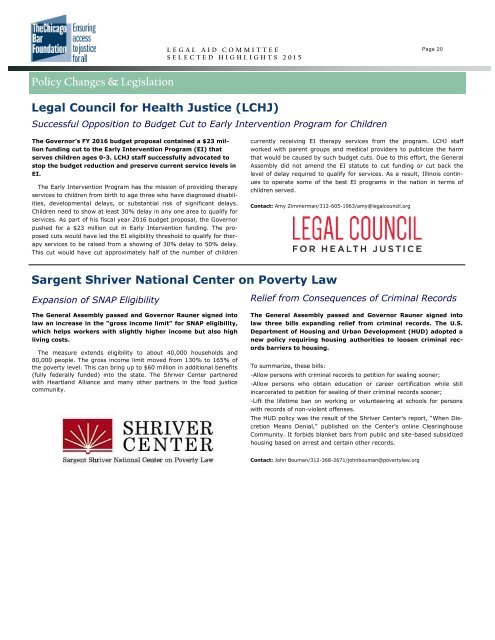Legal Aid Committee Selected Highlights 2015
1Stgu15
1Stgu15
You also want an ePaper? Increase the reach of your titles
YUMPU automatically turns print PDFs into web optimized ePapers that Google loves.
L E G A L A I D C O M M I T T E E<br />
S E L E C T E D H I G H L I G H T S 2 0 1 5<br />
Page 20<br />
Policy Changes & Legislation<br />
<strong>Legal</strong> Council for Health Justice (LCHJ)<br />
Successful Opposition to Budget Cut to Early Intervention Program for Children<br />
The Governor’s FY 2016 budget proposal contained a $23 million<br />
funding cut to the Early Intervention Program (EI) that<br />
serves children ages 0-3. LCHJ staff successfully advocated to<br />
stop the budget reduction and preserve current service levels in<br />
EI.<br />
The Early Intervention Program has the mission of providing therapy<br />
services to children from birth to age three who have diagnosed disabilities,<br />
developmental delays, or substantial risk of significant delays.<br />
Children need to show at least 30% delay in any one area to qualify for<br />
services. As part of his fiscal year 2016 budget proposal, the Governor<br />
pushed for a $23 million cut in Early Intervention funding. The proposed<br />
cuts would have led the EI eligibility threshold to qualify for therapy<br />
services to be raised from a showing of 30% delay to 50% delay.<br />
This cut would have cut approximately half of the number of children<br />
currently receiving EI therapy services from the program. LCHJ staff<br />
worked with parent groups and medical providers to publicize the harm<br />
that would be caused by such budget cuts. Due to this effort, the General<br />
Assembly did not amend the EI statute to cut funding or cut back the<br />
level of delay required to qualify for services. As a result, Illinois continues<br />
to operate some of the best EI programs in the nation in terms of<br />
children served.<br />
Contact: Amy Zimmerman/312-605-1963/amy@legalcouncil.org<br />
Sargent Shriver National Center on Poverty Law<br />
Expansion of SNAP Eligibility<br />
The General Assembly passed and Governor Rauner signed into<br />
law an increase in the “gross income limit” for SNAP eligibility,<br />
which helps workers with slightly higher income but also high<br />
living costs.<br />
The measure extends eligibility to about 40,000 households and<br />
80,000 people. The gross income limit moved from 130% to 165% of<br />
the poverty level. This can bring up to $60 million in additional benefits<br />
(fully federally funded) into the state. The Shriver Center partnered<br />
with Heartland Alliance and many other partners in the food justice<br />
community.<br />
Relief from Consequences of Criminal Records<br />
The General Assembly passed and Governor Rauner signed into<br />
law three bills expanding relief from criminal records. The U.S.<br />
Department of Housing and Urban Development (HUD) adopted a<br />
new policy requiring housing authorities to loosen criminal records<br />
barriers to housing.<br />
To summarize, these bills:<br />
-Allow persons with criminal records to petition for sealing sooner;<br />
-Allow persons who obtain education or career certification while still<br />
incarcerated to petition for sealing of their criminal records sooner;<br />
-Lift the lifetime ban on working or volunteering at schools for persons<br />
with records of non-violent offenses.<br />
The HUD policy was the result of the Shriver Center’s report, “When Discretion<br />
Means Denial,” published on the Center’s online Clearinghouse<br />
Community. It forbids blanket bars from public and site-based subsidized<br />
housing based on arrest and certain other records.<br />
Contact: John Bouman/312-368-2671/johnbouman@povertylaw.org


